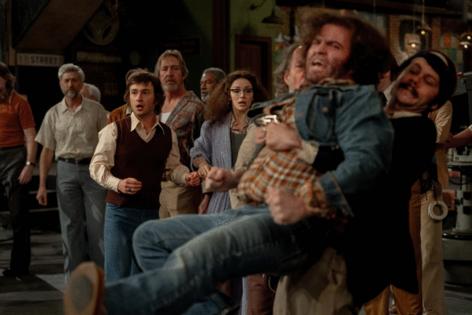'Saturday Night' review: Skimming the surface of the very first 'SNL'
Published in Entertainment News
Making a movie about famous funny people: super hard. Audiences spend half the time watching it performing stupid checklist tricks in their minds. (Is the nose right? Did that really happen? Wasn’t the real person taller? Sexier? More talented?) It’s no way to give any docudrama, or docu-comedy, a fair shake.
Backstage stories about those famous funny people: even harder. Capturing the personalities and the vibe behind the fingers-crossed launch of an extraordinarily influential TV phenomenon has — as Desi Arnaz used to scold Lucille Ball on “I Love Lucy,” in earlier show business era — a lot of explaining to do, and deciding. Do we make it inside-baseball for comedy nerds, or more of a general-interest thing to win over new fans while satisfying the presold ones? Aim for relative fidelity to the historical record, or chase the spirit but not the letter, for example, of the 90-odd minutes preceding the first live episode of NBC’s “Saturday Night” on Oct. 11, 1975?
“Saturday Night” is about those 90-odd minutes. It has its moments, and some effective performances. But it’s all moments, really, without much momentum until the final stretch before showtime. As for the truth quotient, well, some of it happened, some of it didn’t; some of it happened but not this way; and too many essentially factual bits feel hoked-up and made-up, with a coating of smugness about putting one over on the squares. I’m all for putting one over on the squares, and always have been. But getting all sanctimonious about it? Score one for the squares.
To this relative non-scholar of “Saturday Night Live,” as the show was renamed two seasons after its debut, director and co-writer Jason Reitman’s treatment is all surface and ’70s slow-zooms for atmosphere. The screenplay, co-written by Gil Kenan, preoccupies itself with lionizing a major figure in contemporary comedy, producer Lorne Michaels, whose importance does not here translate to a compelling protagonist. It’s more a writing problem than an acting problem, but as played by Gabriel LaBelle (“The Fabelmans”), Michaels emerges in “Saturday Night” as an intuitive savant, dreamy and diffident and one of the more undefined figures ever to center a comedy about comedy.
The setup: As a hedge against contractual negotiations with Johnny Carson and “The Tonight Show,” the NBC brass green-lit an unproven counterculture variety show starring, initially, Chevy Chase (Cory Michael Smith), John Belushi (Matt Wood), Gilda Radner (Ella Hunt), Dan Aykroyd (Dylan O’Brien), conspicuously underused Garrett Morris (Lamorne Morris) and the rest.
Producer/creator Michaels and company found themselves with at least 200% too much show for the first show, with its ungainly lineup of sketches, musical guests (Janis Ian and Billy Preston), Jim Henson’s Muppets (destined for a quick ejection from this universe of snark) and guest-host segments (George Carlin did the honors for the first episode).
Like a wannabe ’70s Robert Altman film, “Saturday Night” drifts, glides, weaves and bobs from subgroup to subgroup readying this imminent probable disaster. In dressing rooms and hallways, or smoked-filled offices with a little cocaine here and there (though “a little” seems less than historically accurate), we spend time with Michaels and his soon-to-be-ex-wife and creative partner Rosie Shuster (Rachel Sennott) as they put out various fires, some literal. In one undisclosed location or another, there’s Belushi, who hasn’t signed a contract yet, or Jane Curtin (Kim Matula), or the network’s weekend late-night programming head Dick Ebersol (Cooper Hoffman). It’s a zoo and there’s a llama in the hallway to prove it. This detail is both false and true; the llama didn’t make its first appearance backstage or on-air until a few shows later.
The ferment feels more like a half-remembered blur in “Saturday Night.” The standoffs backstage, with tempers rising, settle for conventional snobs versus slobs comedy, the open-secret ingredient in so many “SNL”- and National Lampoon-derived movies that came later. In Reitman’s “Saturday Night” the show and all its creators portray the slobs; the snobs are the censors, the network brass and old-school celebrities such as Milton Berle (played here by J.K. Simmons, with a partially glimpsed prosthetic penis). Can this mild-mannered Canadian, Michaels, triumph against such forces?
The script periodically brakes for a reflection on the show’s “visionary” breakthrough-ness, or a hushed observation of the chaotic brilliance of it all. (At one point, we hear that Belushi will be “more important than Brando. He’ll be studied.”) If the crew putting that first episode together, with Scotch tape and a little luck, truly had time to commemorate their colleagues’ genius an hour, or a half-before, before showtime, I hope they came off less precious in real life.
Visually Reitman and cinematographer Eric Steelberg try a little of everything, swish-panning between two sides of an argument, twice or thrice too often, or shooting in tight, spatially crammed telephoto images to underscore the sweatbox vibe. Elsewhere the camera trails after the backstage doings and undoings in long, verité style takes. The idea is a swirl of creativity under pressure, but with strange interludes of Zenlike calm and self-conscious rumination, less persuasively realized, even up against the deadline.
Dying is easy. Comedy is hard. Comedy about comedy may be hardest of all. In 2024 a movie about a live-TV countdown to destiny, once upon a time in ’75, needs more than moderately skillful reverence, and reaction shots of people cracking up at colleagues, to show us what it might’ve been like to be there.
———
'SATURDAY NIGHT'
2 stars (out of 4)
MPA rating: R (for language throughout, sexual references, some drug use and brief graphic nudity)
Running time: 1:49
How to watch: In select theaters Oct. 4, in wide release Oct. 11
———
©2024 Chicago Tribune. Visit chicagotribune.com. Distributed by Tribune Content Agency, LLC.













Comments